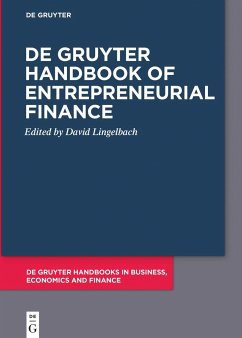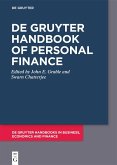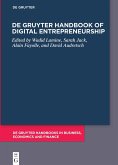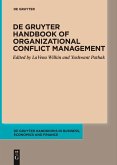As of early 2022, seven of the ten largest firms in the world by market capitalization had been funded through various types of entrepreneurial finance. This handbook provides an up-to-date survey of what we know about this significant phenomenon in all its forms, and where our knowledge about it needs to head from here. The handbook embraces a wide range of established and emerging academic and practitioner voices across the globe to explore the theoretical and practical flux and tension in the field.
Until recently, most studies have taken a supply side perspective, focusing on the perspective of those who provide funding to new ventures. This book takes a different, demand side perspective, beginning with the entrepreneur and gradually broadening our view to include close by and then more distant funding sources. Following this approach, it is organized into four parts detailing the individual level (founders' resources, bricolage and bootstrapping, effectuation and portfolio entrepreneurship); the inner circle (informal financing, business groups, incubators and accelerators); the wider world (formal debt, microfinance, venture capital, corporate venture capital, business angels, government funding and family offices); and emerging perspectives (non-Western perspectives, gender, indigenous perspectives, post-conflict and disaster zones and ethics).
The introduction considers the general state of the field, while the conclusion takes on additional topics relevant to entrepreneurial finance, such as decentralized finance, big data, behavioral economics, financial innovation and COVID-19, as well as possible ways in which entrepreneurial finance can have a greater impact on other disciplines.
This handbook will be a core reference work for researchers, practitioners, and policy makers seeking an up-to-date academic survey of entrepreneurial finance. It can also be used as a primary text in Ph.D. seminars in entrepreneurship, entrepreneurial finance, and finance. Instructors in Master's level courses in entrepreneurial finance and venture capital will also find the book of benefit.
Until recently, most studies have taken a supply side perspective, focusing on the perspective of those who provide funding to new ventures. This book takes a different, demand side perspective, beginning with the entrepreneur and gradually broadening our view to include close by and then more distant funding sources. Following this approach, it is organized into four parts detailing the individual level (founders' resources, bricolage and bootstrapping, effectuation and portfolio entrepreneurship); the inner circle (informal financing, business groups, incubators and accelerators); the wider world (formal debt, microfinance, venture capital, corporate venture capital, business angels, government funding and family offices); and emerging perspectives (non-Western perspectives, gender, indigenous perspectives, post-conflict and disaster zones and ethics).
The introduction considers the general state of the field, while the conclusion takes on additional topics relevant to entrepreneurial finance, such as decentralized finance, big data, behavioral economics, financial innovation and COVID-19, as well as possible ways in which entrepreneurial finance can have a greater impact on other disciplines.
This handbook will be a core reference work for researchers, practitioners, and policy makers seeking an up-to-date academic survey of entrepreneurial finance. It can also be used as a primary text in Ph.D. seminars in entrepreneurship, entrepreneurial finance, and finance. Instructors in Master's level courses in entrepreneurial finance and venture capital will also find the book of benefit.








